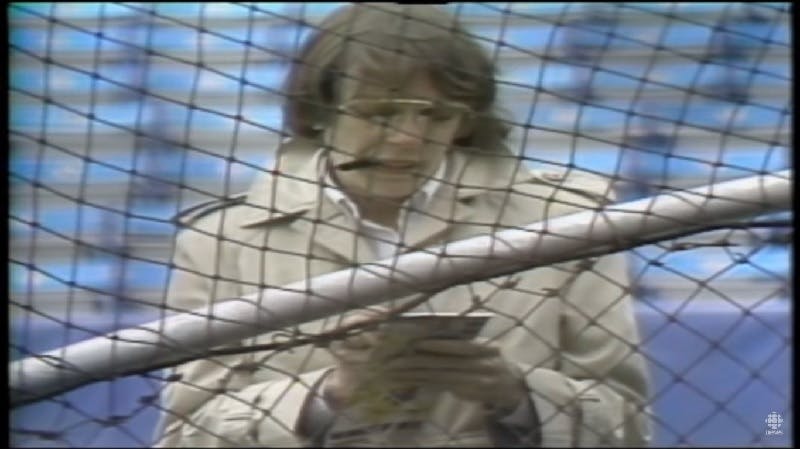Fowles: Alison Gordon Should Be On the Level of Excellence

“I had laughter and good times on the beat and others that brought me to tears, but it was seldom dull. How could it be with a game every day? The road was often bumpy, but it was an unforgettable trip.”—Alison Gordon, Foul Balls: Five Years in the American League, 1984
If you’ve attended games at the Rogers Centre you’ve likely noticed that on the 500 level there is a collection of ten high profile names. Plucked from Toronto Blue Jays history for their “tremendous individual achievement,” The Level of Excellence honours them with a lovely in-stadium nod, and in turn celebrates the franchise’s storied past. That hallowed list offers a collection of standout players, a president, CEO, and founding father, a VP, and a broadcast legend. There’s always a great deal of fun fan banter and debate about who deserves to be there, with Carlos Delgado the most recent addition in 2013.
But one name that has long struck me as missing is that of Alison Gordon, Major League Baseball’s first female beat writer. She covered the fledgling team for The Toronto Star from 1979 to 1984, and according to past Jay Lloyd Moseby, she was relentless despite her job’s unique difficulties. “A lot of women that are in the profession right now should be very thankful for what Alison did and what she went through,” the former outfielder told The Star after her death at 72 in 2015. “She took a beating from the guys. She was a pioneer for sure.”
It would be hard for many of us to understand how difficult and isolating it must have been for Gordon to cover the team in the late seventies and early eighties. (“I certainly dodged foul balls, literal and figurative,” she wrote in 1984.) Though things are certainly not perfect for women in the industry now, that era was one where women in baseball media were almost entirely absent, and those that were there often became the target of hostility. The MLB clubhouse ban on women was overturned less than a year before Gordon started, and her Baseball Writers Association of America card—the first ever issued to a woman—famously read “Mr. Alison Gordon” because at the time there was no option for anything else.
Embed from Getty ImagesA self-proclaimed “socialist, feminist, hedonist,” Gordon wrote day-to-day during an archaic period where women simply weren’t allowed into the boy’s club of baseball, and she endured abuse, insults, and protests as a result. Her reward? After slogging it out through her first season she received a letter; “Madam—I see where you don’t seem to mind male nudity in athletes shower rooms at sports arenas. Well, neither would any whore.”
“Perhaps naively, I jumped at the chance without really thinking about the consequences,” she wrote in her book Foul Balls. “Had I known then what I now know about the nature of the sport and about the men who play it, manage it, and report on it, I might not have been so quick to sign on, so I thank my ignorance. Had timidity won out, or good sense prevailed, I would have missed meeting a raft of fascinating people.”
Beyond being a notable pioneer in the realm of women in sports media, Gordon was also very good at her job. Her writing is superb, she won a National Newspaper Award citation for her work, and she ended up publishing numerous books on the game—non-fiction and fiction—after she left the beat. When she died unexpectedly in 2015, there was an outpouring of love and admiration from players, colleagues, and friends alike, with one I interviewed at the time calling her “a feisty, funny, smart, sometimes testy, always funny woman.” Others added that she had an enduring passion for this game, and that her characteristic saltiness and sense of humor served her well in taking on such a difficult and exclusionary vocation.
When I talk to people about Gordon’s unique position in MLB history—and her skill, talent, and legacy—fans are often surprised they’ve never heard of her. It’s as if she’s somehow been left out of the overall narrative of this great game. Though The Level of Excellence is largely reserved for past players of the highest caliber—Alomar, Bell, Carter, etc.—it has certainly made room for individuals who have made an off-the-field impact on baseball and on the franchise; Pat Gillick, Paul Beeston, and perhaps with most relevance to Gordon’s case, beloved broadcaster Tom Cheek. Given how groundbreaking Gordon’s role was not only for the Jays, but for Major League Baseball as a whole, it feels like it makes good sense to see her name up there, if only to educate the fan base on her notable and vital influence.
“I guess no place can be all bad on game day,” Gordon once wrote. Given she is one of Toronto’s own, it only makes good sense for us to celebrate her love of this game in a way that is worthy of her tremendous impact, and that honours how much she helped to change the culture for the better.
Recent articles from Stacey May Fowles





